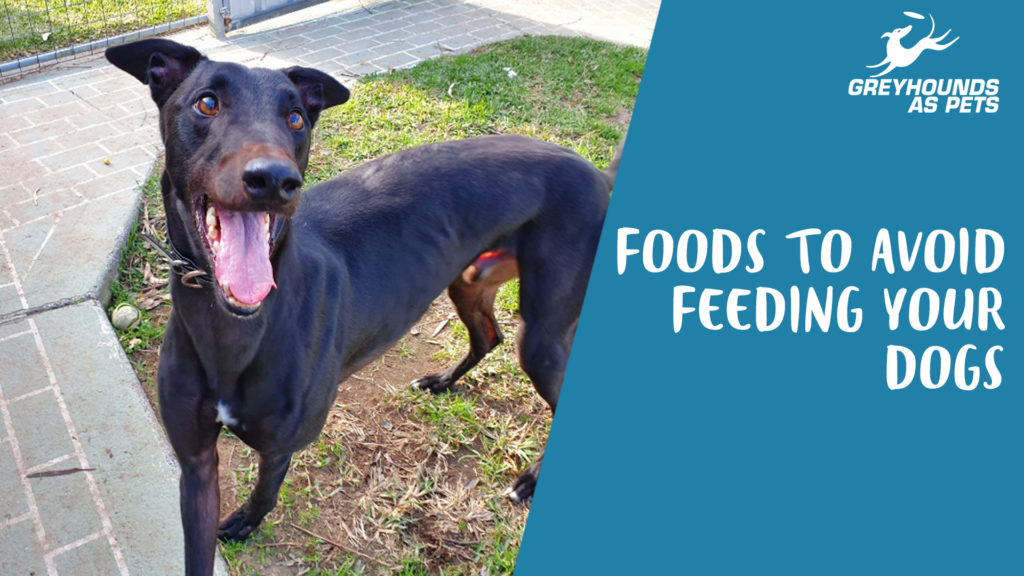
Foods to avoid feeding your dogs
It’s so easy to reward your best mate with a bit of food from your plate, as they intently stare at every bite you take. While the occasional dog-friendly treat is ok, what you feed your dog may actually be dangerous and sometimes poisonous to your dog.
Here are common foods you should never feed your dog:
- Chocolate: Most dog owners know that chocolate is bad for their pets. Chocolate contains a stimulant called theobromine which can cause vomiting, diarrhoea, heart problems, tremors, seizures and in severe cases, death.
- Avocado: Persin is a fungicidal toxin found in avocado (including the leaves of the actual plant) which can cause vomiting and diarrhoea in dogs.
- Caffeine: Caffeine can be fatal for dogs and can cause a similar toxic response as when a dog consumes chocolate. Keep your dog well away from coffee (including beans and the grounds), tea, energy drinks, colas and cold and flu medications. A small Puppacino only it is for your favourite pooch on your visit to your favourite Barista!
- Grapes and Raisins: Grapes and raisins can cause kidney failure in dogs, even in small amounts.Vomiting, diarrhoea and lethargy can occur within 12 hours of consumption, and an untreated dog can develop long-term kidney disease or die from kidney failure in as quickly as 3-4 days.
- Macadamia Nuts: Macadamia nuts can cause weakness, depression, tremors, vomiting and fever in dogs. As little as 6 nuts can adversely affect your dog for 12 – 48 hours.
- Xylitol: Commonly used as an artificial sweetener in lots of ‘sugar-free’ foods, Xylitol causes an insulin release which can lead to potentially fatal hypoglycaemia in dogs. Symptoms of Xylitol poisoning include lethargy, vomiting, coordination issues and seizures.
- Alcohol: This is an obvious one, butit only takes the smallest amount of alcohol from beverages or food products to make your dog very sick. Symptoms include vomiting, diarrhoea, breathing problems, tremors and loss of coordination.
- Milk and dairy: As tempting as it is to give your dog the rest of your melted ice cream on a hot day, milk-based products can cause digestive upset to your dog so should be avoided. Dogs don’t have sufficient lactase to break down the lactose found in milk, feeding milk-based products to your dog can cause diarrhoea and trigger food allergies.
- Bones: While it might seem natural to ‘give a dog a bone’ to enjoy and to help keep their teeth clean, only certain types of bones are recommended. Small bones can be a choke hazard and wreak havoc on a dog’s digestive system. Bone splinters, which occur easily in cooked bones, can cause internal injuries to the digestive tract or even cause blockages. When giving your dog bones go for something like a human grade large raw meaty bone and monitor them at all times whilst they are enjoying their treat.
Inevitably dogs will find their way into places they shouldn’t and eat things that will cause them harm at some stage during their life. In case of such emergency, keep the number of your vet and closest emergency clinic somewhere obvious like the fridge door for quick access and never hesitate to call and have a chat to them if you’re unsure what your dog may have eaten and if it might be a problem. Getting prompt treatment could minimise the harm these poisonous foods can do to your furry friend.
More news
- National Adoption Day A Huge SuccessApril 28, 2025 12:52
 GRNSW Partners With The Mark Hughes FoundationBy The News TeamApril 27, 2025 13:21
GRNSW Partners With The Mark Hughes FoundationBy The News TeamApril 27, 2025 13:21 Adopting Happiness: Kelly & SonnyBy Greyhounds as Pets NSWApril 25, 2025 14:45
Adopting Happiness: Kelly & SonnyBy Greyhounds as Pets NSWApril 25, 2025 14:45 Adopting Happiness: Mitch BeerBy Greyhounds as Pets NSWApril 25, 2025 13:00
Adopting Happiness: Mitch BeerBy Greyhounds as Pets NSWApril 25, 2025 13:00 James Tedesco Our New GAP AmbassadorBy The GAP News TeamApril 23, 2025 16:03
James Tedesco Our New GAP AmbassadorBy The GAP News TeamApril 23, 2025 16:03 A Record 81 Greyhounds adopted across NSW as Happiness takes centre stageBy Greyhounds as Pets NSWMarch 26, 2025 11:30
A Record 81 Greyhounds adopted across NSW as Happiness takes centre stageBy Greyhounds as Pets NSWMarch 26, 2025 11:30